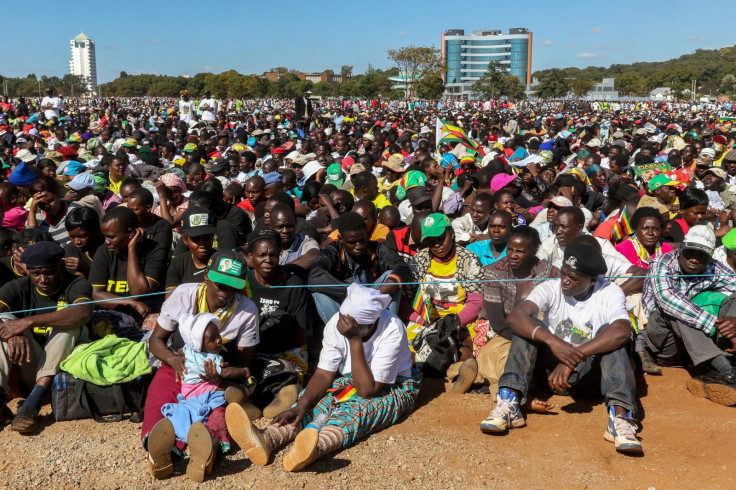Zimbabwe: President Mugabe's Zanu-PF accused of torching opposition supporters homes ahead of rally

Tens of thousands of Zimbabweans marched through the capital, Harare, on 25 May in support of President Robert Mugabe, who has ruled the country since 1980. However, it has since emerged that Zimbabweans who refused to take part in the march had their homes torched.
Organized by Zanu-PF's youth wing, the rally comes amid a bitter political battle within Mugabe's ruling Zanu-PF, which has seen two rival factions – G40 and Team Lacoste – fight for control of the party. The First Lady Grace Mugabe leads the G40, which is opposed to Vice-President Emmerson Mnangagwa's faction Team Lacoste, which is backed by the war veterans.
The unrest also follows claims that Zanu-PF has been carrying out politically-motivated violence ahead of the 2018 general elections.
Zanu-PF in-fighting is 'treasonous'
While Zimbabwe's Million Man March, which failed to live up to Zanu-PF stalwarts' aim to attract a million people, many of the marchers were bussed in from all over the country. Wearing T-shirts bearing Mugabe's image, the supporters sang songs praising the veteran head of state, who addressed the crowds at a central square.
"We are happy that we are marching for our president to prevent the opposition from distracting the country's leader," Taremedzwa Chikara, 56, a housewife and supporter of Mugabe's Zanu-PF party was reported as saying by The Guardian. "Our president has the people at heart and we support that a lot."
In his speech, Mugabe denounced the factional in-fighting between senior Zanu-PF members as betrayal. "There should never be little groups to promote so and so. Those little groups are treasonous groups, they spoil the party," he said.
In February, Zimbabwean police fired tear gas and used a water cannon to disperse hundreds of ex-fighters who had planned to march on Zanu-PF's headquarters to protest against the first lady. Although she has said she has no ambitions to run for the top seat, commentators believe she is a leading candidate to succeed her husband. Speaking at the rally, Grace Mugabe suggested that the president would continue to lead Zimbabwe even after death.
Homes of opposition supporters 'torched'
Reports of violence and political repression have increased significantly in Zimbabwe; still reeling from a violent political crisis that occurred in the aftermath of the presidential elections held in March and June 2008.
At the time, supporters of Zanu-PF and main opposition Movement for Democratic Change (MDC-T) blamed each other for perpetrating killings, torture, and politically motivated violence, but the international community accused the ruling party of instigating most of it. More than 200 people were killed, 5,000 more were beaten or tortured, and a further 36,000 were displaced.
MDC-T, led by Morgan Tsvangirai, has again accused suspected Zanu-PF activists of torching the homes of its supporters in rural Zhombe, Midlands province, for refusing to participate in the rally. MDC-T supporters and human rights activists shared photos which showed the torched homes on social media.
The price for not attending Mugabe Praise & Worship -This is what ZANU PF does in Zimbabwe #MillionManMarch pic.twitter.com/lnZgjXkkpB
— African (@ali_naka) May 27, 2016
According to NewsDay newspaper, one of the affected MDC-T supporters alleged the arson was committed on Monday night. He is reported as saying the attack came after they had refused to attend a preparatory meeting called for by Zanu-PF.
The MDC-T activists were reported as saying one family, whose four grass-thatched houses were set on fire, had been shunned by neighbours for fear of political victimisation. According to opposition member, Chalton Hwende from Chegutu West, the victim was the uncle of MDC-T national executive member, Memory Mbondiah.
A month ago, Zanu-PF was also accused of threatening to carry out a terror campaign similar to the 2008 violence which left large numbers of MDC-T supporters dead. In an audio recording broadcast by US-based private radio station VOA on 27 April, top Zanu-PF officials and traditional leaders in the southern Masvingo Province were allegedly heard threatening opposition supporters with death.
© Copyright IBTimes 2024. All rights reserved.






